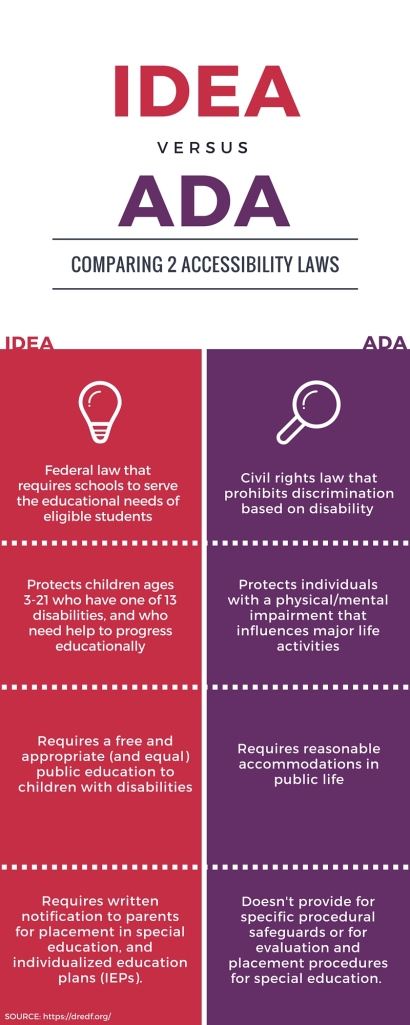Two key laws that college-bound students (and their parents) should know about
Americans with Disabilities Act (ADA)
Students with disabilities who have utilized accommodations or modifications under an Individual Education Plan (IEP) or a Section 504 plan in high school will likely be looking to continue to receive accommodations and disability related supports in college. However, it’s important to remember that special education under the Individuals with Disabilities Education Act (IDEA) exists in K-12 education only. Once students cross the stage at high school graduation the Americans with Disabilities Act (ADA) takes over.

Not only is the law different, but students should know that some of the support and accommodations they’ve had in high school won’t necessarily be available in college. In fact, some rather typical special education modifications just don’t translate to the college setting. Here are a few high school accommodations that may look quite different on a college campus:
Copies of teacher’s notes: Most colleges utilize peer note takers and a note taking accommodation is meant to simply be a supplement to a student’s own class notes. In some instances, students may receive an accommodation for the ability to audio record class lectures, in place of a personal note taker. This usually works well for a student with focus challenges or someone who has difficulty simultaneously listening to the lecture and taking down notes. Some faculty will post copies of the PowerPoint slides for the class, however, this isn’t something disability services can require of faculty. *Check out this note taking technology solution: Smart Pen
Additional time for assignments: Some colleges may approve an accommodation that provides additional time for assignments based on a students’ documented disability. This can be helpful if there are certain types of assignments that give a student trouble (eg: writing assignments, long-term projects). In reality, assignment extensions often have a negative impact on students with disabilities since it can cause a backlog of assignments that must be completed before the semester ends. Students who need additional time to complete academic work may, instead, consider requesting an accommodation for a reduced course load.
Preferential seating: College classes rarely have assigned seating. Students who benefit from a specific seating arrangement (eg: seating close to the teacher for focus) may be encouraged to simply choose the seat that best meets their learning needs.
Extra credit: While some faculty may offer opportunities for extra credit, grading policies are the same for all students and there is no special considerations due to disability.
Modified grades: No, sorry.
1:1 classroom aide: This is a tricky one, particularly if classroom needs are not directly related to academic tasks (ie: transcription for someone with physical limitations) or accessibility (ie: note taking or interpreting). An accommodation might allow for a personal care attendant (PCA) for non-academic classroom tasks due to physical limitations. When a disability impacts behavior, students run the risk of not being considered “otherwise qualified” and colleges can point to behavioral problems as disqualifying a student from dormitory living, on-campus programming, or attendance altogether. Get more information about what it means to be considered “otherwise qualified” here.
Family Educational Rights and Privacy Act (FERPA)
Family Education Rights and Protection Act (FERPA) ensures that educational information, personally identifiable information, and directory information is protected. It gives college students the right to review their own records and to decide who has access. This means college representatives are prohibited from discussing information about the student’s academic record with parents. This applies even if the student is under 18.
There are a few instances where information can be shared without a student’s consent. First, if a student is considered a threat to themselves or to others, college personnel may share information with parents. Secondly, for a student under 21, violations related to drug or alcohol use may be disclosed to parents.
Please note that while FERPA allows campuses to release information to parents under these circumstances, it does not require it. School policies vary widely regarding parental notification.
Students may give written permission to release their records by signing a Consent for Release of Records. However, it’s important to remember that students may be required to complete a release form each time information is to be released and they must follow whatever process the university sets forth regarding releasing records. Additionally, college students can revoke FERPA consent at any time.
So what’s the best way to find out about your college student’s progress and experience? Families should engage in dialogue with their college student about their expectations and decide what the student’s communication responsibilities are, including how often you will talk together and what information will be shared. It is best to work together to create a communication plan, in advance, that both the student and parent can feel good about.
Want more information? Check out 7 things to know about College Disability Services
Rothstein, L. (2009). Disability law issues for high risk students: Addressing violence and disruption. Journal of College and University Law, 35(3), 691-720.